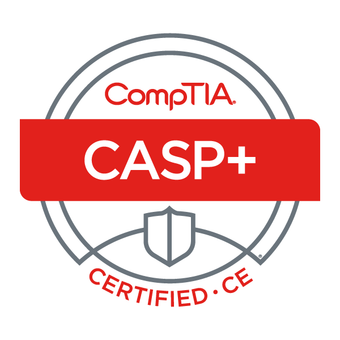CAS-004

| Formats: | Asynchronous |
| Blended | |
| Online | |
| Onsite | |
| Part-time | |
| Level: | Advanced |
| Prerequisites: | |
| Recommended Knowledge | |
| Technical Background Required | |
| Practical experience in implementing and managing security solutions | |
| CompTIA Security+ | |
| CompTIA CySA+ | |
Formats: We offer our training content in a flexible format to suit your needs. Contact Us if you wish to know if we can accommodate your unique requirements.
Level: We are happy to customize course content to suit your skill level and learning goals. Contact us for a customized learning path.
CompTIA CASP+ (CAS-004)
The CompTIA Advanced Security Practitioner (CASP+) certification (Exam CAS-004) is an advanced, vendor-neutral credential for technical professionals who wish to remain hands-on in technology, focusing on security architecture and engineering/, rather than moving strictly into management. The performance-based exam validates advanced-level competency in designing, implementing, and integrating robust security solutions across complex enterprise environments.
CASP+ validates high-level skills in the following crucial areas:
- Risk management,
- Enterprise security operations and architecture, and
- Security engineering and integration.
CASP+ is compliant with ISO 17024 standards and is approved by the U.S. Department of Defense (DoD) to meet directive 8140/8570.01-M requirements for technical management. The CASP+ certification training course provides candidates with the advanced technical skills needed for senior security engineering roles in traditional, cloud, and hybrid environments. Additionally, it deeply covers governance, risk, and compliance (GRC) skills and teaches how to assess an enterprise’s cybersecurity readiness and implement robust, resilient security solutions.
Target Audience
CASP+ is intended for senior-level security professionals who want to lead the technical design and implementation of security solutions. This typically includes individuals in roles such as:
- Senior Security Engineer
- Security Architect
- Security Analyst (Level III/Senior)
- Security Consultant
- Information Security Officer (Technical Focus)
- Application Security Engineer
Recommended Prerequisites
CompTIA recommends that candidates have significant hands-on experience before attempting the CASP+ exam. While there are no enforced prerequisites, the following is strongly advised for success:
- Minimum 10 years of general hands-on experience in IT administration.
- At least 5 years of cumulative experience in hands-on technical security roles.
- Possession of, or knowledge equivalent to, a certification like CompTIA Security+ and CompTIA CySA+ or PenTest+ (or equivalent certifications like CISSP, CCNP Security, etc.).
Course Objectives
1.0 Security Architecture (29%)
- Analyze a scenario and integrate network and security components, concepts, and architectures to meet security requirements
- Analyze a scenario to integrate security controls for host devices to meet security requirements
- Analyze a scenario to integrate security controls for mobile and small form factor devices to meet security requirements
- Given software vulnerability scenarios, select appropriate security controls
2.0 Security Operations (23%)
- Given a scenario, conduct a security assessment using the appropriate methods.
- Analyze a scenario or output, and select the appropriate tool for a security assessment
- Given a scenario, implement incident response and recovery procedures
3.0 Security Engineering and Integration (27%)
- Given a scenario, integrate hosts, storage, networks, and applications into a secure enterprise architecture
- Given a scenario, integrate cloud and virtualization technologies into a secure enterprise architecture
- Given a scenario, integrate and troubleshoot advanced authentication and authorization technologies to support enterprise security objectives
- Given a scenario, implement cryptographic techniques and security controls to secure communications
4.0 Governance, Risk, and Compliance (GRC) (21%)
- Summarize business and industry influences and associated security risks
- Compare and contrast security, privacy policies, and procedures based on organizational requirements
- Given a scenario, execute risk mitigation strategies and controls
- Analyze risk metric scenarios to secure the enterprise
Skills Acquired
Upon completing this course, you will be able to:
- Analyze and mitigate complex information security risks at the enterprise level.
- Conduct comprehensive incident response and detailed recovery planning.
- Design and develop secure cybersecurity architectures for development, staging, and production systems across hybrid environments.
- Apply research methods to evaluate industry trends and their impact on long-term security strategy.